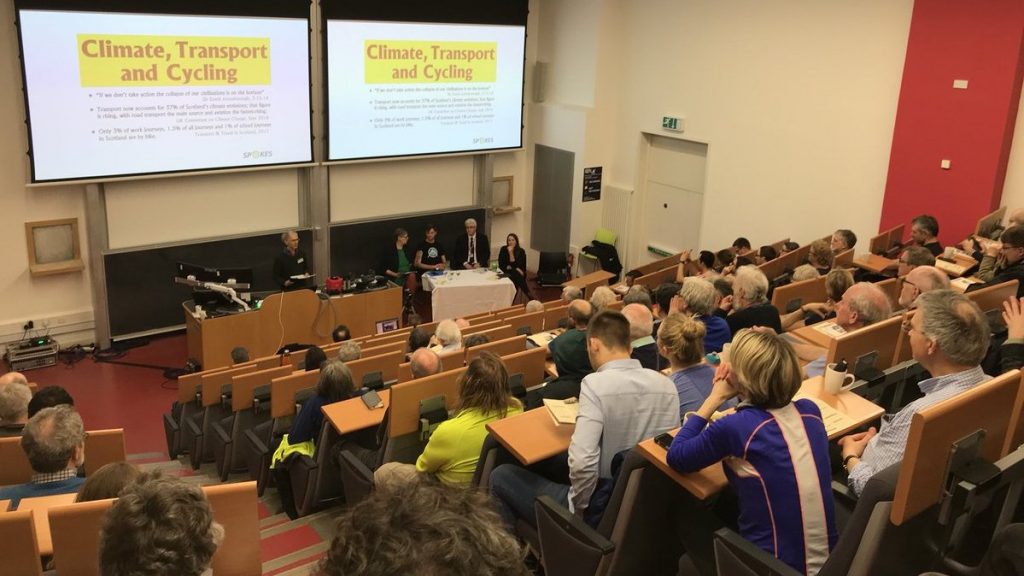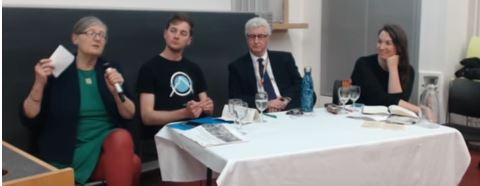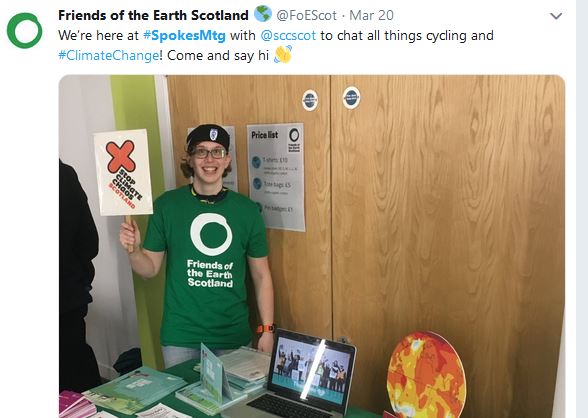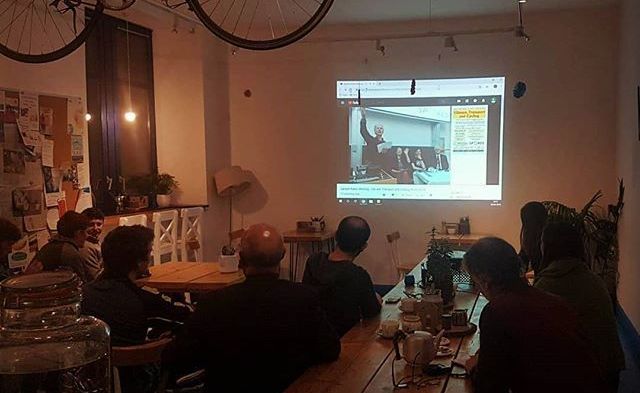Some main points to emerge from our 110-strong public meeting…
- The climate is in crisis and action is urgent
- The crisis embodies many inequities, with greater impacts likely on the young and on poorer people and poorer countries – i.e. those least responsible for causing the crisis
- Transport is the biggest, and growing, contributor to Scottish and UK emissions. Substantial modal shift to cycling in urban areas worldwide would have a valuable impact
- It is important for concerned individuals not only to live in an environmentally responsible way but also to take the personal into the political – speak to friends and colleagues, contact MSPs and attend events which raise awareness
- Young people are increasingly doing this now, and older people need to take the climate crisis equally seriously.

“If we don’t take action the collapse of our civilisations is on the horizon,” Sir David Attenborough, UN Climate Conference, 3.12.18
See later in this article for links to a video of the entire meeting, including the Q/A, and also the slides used by the speakers in their presentations. But here are a couple of main points from each speaker…
Dave du Feu [Spokes, introducing the meeting]
- Transport is already Scotland’s and the UK’s biggest source of climate emissions. Yet the Scottish Government predicts that, under its current policies, motor traffic and air travel is set to rise hugely
- Although cycling investment has risen, the continuing expansion of the main road system has major negative consequences, both direct and indirect, for getting about by bike.
Claudia Beamish MSP [Co-convener of Scottish Parliament cross-party group on cycling, walking and buses; Labour Environment & Climate spokesperson] … Parliamentary perspective
- Latest research shows it is vital to keep global temperature rise to 1.5 degrees
- Bills now in Parliament are an opportunity to press for improvements – the Climate Change Bill, Transport Bill and 20mph Bill
Alex Luetchford [2050 Climate Group, Co-Chair of the Policy Sub-Group] … A young person’s perspective
- Young peoples’ transport patterns differ substantially from their elders (and often from young people in previous generations) – including less driving and more cycling
- 2050 Climate Group works through education and negotiation but other methods such as the school strikes for climate are also very worthwhile
Dave Gorman [Head of Edinburgh University Department of Social Responsibility and Sustainability] … How Edinburgh University, is responding to the climate challenge, particularly in terms of staff and student travel
- In terms of land transport the university is doing very well (e.g. 23% of staff and students cycle to KB) but flights are a huge and growing problem, both for overseas students and academic work
- The university is committed to being zero carbon by 2040. Many flights are essential, but this will be the next area of focus for research and instigating behaviour change
Caroline Rance [Friends of the Earth Scotland, Climate Campaigner] … The Climate Bill and related actions
- Tackling climate change must be rapid, far-reaching and unprecedented in scale [IPCC 1.5 degree report]
- Transport is the biggest emissions source and needs major policy changes. We can all help by contacting MSPs and attending relevant events and protests.

QA session [from video]
There was then a 45-minute audience QA/ panel discussion chaired by Elizabeth Bomberg [Professor of Environmental Politics, University of Edinburgh] Points raised included…
- Presumed (or strict) liability – this is a “fundamental necessity” to improve road safety for cycling and walking, said Claudia
- Transport Bill needs amended to simplify Traffic Regulation Orders, which are delaying some Edinburgh schemes by up to a year
- Workplace Parking Levy – Claudia expresses her personal view in support, whilst explaining why her Parliamentary colleagues disagree (later leading to press controversy)
- 20mph default Bill – Although 20mph is often not adhered to, surveys show that public attitudes are changing, and the South Edinburgh pilot showed 1.6mph speed reduction, equivalent to 10% fewer casualties. There is police enforcement in Edinburgh.
- Internet-connected society/ Big Data – Although there are many potential benefits (e.g. seamless travel between modes, or controlling car speeds) there are ethical questions (e.g. driverless cars) and dangers in increasingly authoritarian societies (e.g. people and all their activities can be tracked through their phones). Dave Gorman states that Edinburgh University is to create a Chair and research programme on Data and AI Ethics.
- Flying – Several organisations (e.g SEPA) ban internal UK flights, why not Edinburgh University, with 50% of its staff/student flights being to London? Dave says the university is studying these flights, but notes that many are overseas students, with the first leg of their journey home being to a London hub airport.
- Active Travel Bill – FOE Scotland is considering pressing for an Active Travel Bill once the Transport and Climate Bills are passed, and Caroline seeks your suggestions for this. [Suggestion – include measures to tackle the next point]
- Road traffic growth predictions – can we halt this scenario, which threatens any hope of bringing transport into line with climate needs? Caroline says – yes, if everyone concerned about Transport and Climate raises their voice!

As usual, there were stalls and tea/coffee before the meeting proper
Meeting resources
- YouTube live stream of meeting [meeting starts at 10:50 in timeline] Unfortunately the sound is out of sync with the visual.
- Presentation slides by Dave du Feu
- Presentation slides by Claudia Beamish
- Presentation slides by Alex Luetchford
- Presentation slides by Dave Gorman
- Presentation slides by Caroline Rance
- #SpokesMtg tweets & pictures
- Meeting poster
- Spokes pre-meeting background article
- Spokes Bulletin 133 and Climate/Transport/Cycling supplement, both providing background to the meeting topic. The supplement includes statements from the political parties at Holyrood.
What you can do now
- Read this article carefully. If you wish to take up and push any of the points, contact your MSPs or councillors, as appropriate…
- MSPs – www.parliament.scot [see ‘Find your MSP’]
- Edinburgh councillors – www.edinburgh.gov.uk/councillors
- Other councillors – see your local council website
- All the politicians who represent you – writetothem.com.
- Retweet the tweet of this article.

Our meeting was live-streamed into a special evening (with cake!) at the Inverness VeloCity community bike cafe. Do call in and say hello next time you are there!! velocitylove.co.uk
